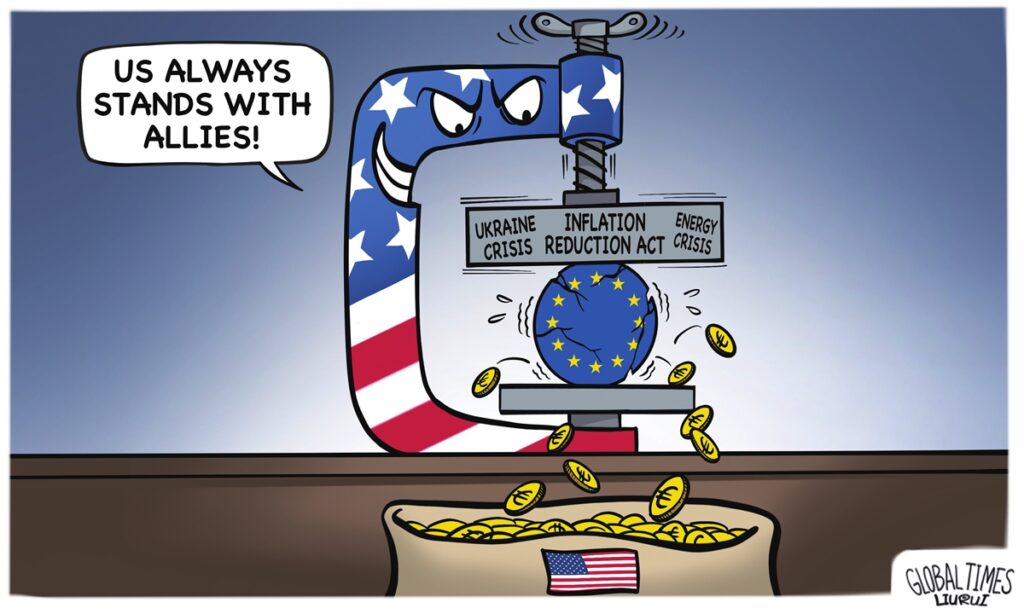With friends like the US, who needs enemies? To realize its own geopolitical goals, the US is never shy to sacrifice its allies.
Citing sources, a Bloomberg report claimed on Monday that Washington suggested European Union (EU) “draw upon lessons from the export control regime they’re using to punish Russia to target China.” The Joe Biden administration is exploring using some of the same information sharing and enforcement coordination to strengthen its export controls on China, the people familiar with the matter told Bloomberg.
Regarding collaboration to restrict exports to Moscow, Washington has clearly benefited a lot since the Russia-Ukraine conflict began. This has seemingly emboldened the US to persuade Europe to take the same approach against China. But this time, it is clearly playing the wrong game.
China is not Russia. The great mutual dependence between China and Europe is much greater than their differences. And judging from the size of China’s economy, its ability to resist suppression and the resilience of China-EU economic ties, it is difficult for the US to push the EU to use economic instruments irrationally against China, said Chinese observers. Obviously, the EU understands this better than the US. And that’s why Europe showed no interest in applying export controls on Russia to China, as Bloomberg reported.
Meanwhile, Saloni Sharma, a spokeswoman for the US National Security Council, refuted the report, stating that the US is not considering extending the Russia export controls to China, nor have they raised doing so with the Europeans.
Nevertheless, with its history of abusing export controls considered, suggesting using the same tactic to deal with a rival is very much a US thing. Washington applies the means of export controls in the name of protecting its economic interests, but often, in fact, out of strategic consideration. It has long weaponized economic exchange in the geopolitical game.
The EU is waking up to this reality. It is reflecting on the consequences of blindly following US’ strategy. For instance, Europe is facing an unprecedented economic hardship, partly due to joining Washington’s sanction endeavors. Its inflation reached 10.7 percent in October, the highest ever monthly reading since the euro zone’s formation.
Under such circumstances, pragmatic economic cooperation with other countries and regions is the critical solution for Europe to relieve its economic pressure, rather than full-scale extreme confrontation. What’s more, such a confrontation would only benefit the US, while others serve US’ interests for nothing. As a result, Europe won’t easily go down the path the US wants.
The ridiculous proposal of export controls on China made to Europe utterly exposes US’ selfish nature and zero-sum thinking. On the one hand, the US wants to put its need to engage in strategic competition with China above the interests of its European allies. In this way, Washington will “sweep the deck” by exploiting Europe’s strength to suppress Beijing, a thorn in its flesh, and subordinating Europe to its strategic needs.
On the other hand, economics-wise, the US is pulling Europe away from the Chinese market to make space for its products. This has already manifested in the energy sector since the beginning of the ongoing war between Moscow and Kiev: The US is gradually taking up Russia’s dominant position in the European market, and selling its energy at high prices to Europe, its so-called friend.
The US will not easily give up lobbying Europe to increase its containment efforts against China. It will continue to create more crises in the Asia-Pacific region, mainly around China, and peddle a sense of anxiety over the “China threat” to Europe. It will also spare no effort to drag Europe into its confrontation with China, even though it is well aware of the painful price Europe will have to pay. In other words, Washington is still going to try its best to make Europe a victim of its selfishness.
(Global Times)




